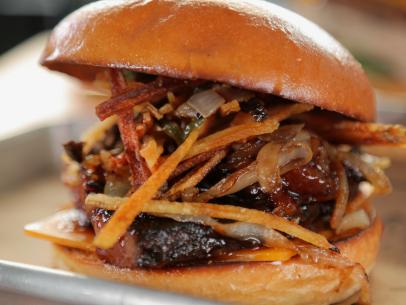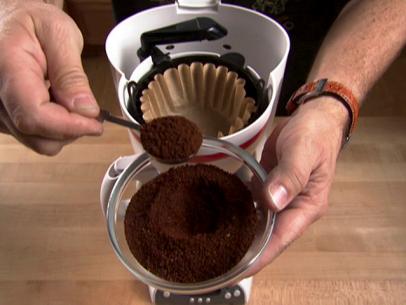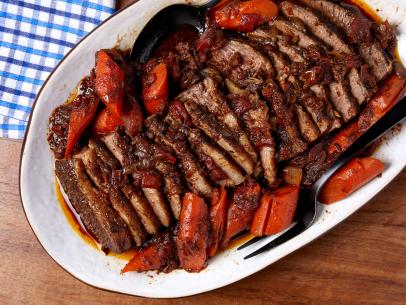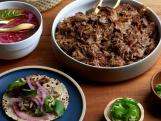
Recipe courtesy of Steven Cook
and
Michael Solomonov
Recipe courtesy of Steven Cook
and
Michael Solomonov
Watch how to make this recipe.
My Mom's Coffee-Braised Brisket
Getting reviews...
- Level: Intermediate
- Total: 21 hr 20 min (includes marinating times)
- Yield: 8 servings
-
- Nutritional Analysis
- Per Serving
- Serving Size
- 1 of 8 servings
- Calories
- 866
- Total Fat
- 61 g
- Saturated Fat
- 22 g
- Carbohydrates
- 30 g
- Dietary Fiber
- 4 g
- Sugar
- 18 g
- Protein
- 50 g
- Cholesterol
- 399 mg
- Sodium
- 1072 mg
This is my take on the dish my mother served at virtually every special-occasion dinner of my childhood. And my mom's version was her take on the dish that her mother made. Brisket has a long history on the Jewish table, primarily because it was a very economical cut. Unfortunately, brisket is no longer cheap, but when cooked properly, it's still one of the beefiest and most flavorful pieces of meat you can find. Whether it's first or second cut (the flat or the point) matters less than making sure the meat has a nice layer of fat on one side.
My grandmother made her brisket with carrots, potatoes, and Heinz Chili Sauce, which gave it a traditional sweet-and-sour flavor. My mother added the coffee--she doesn't remember why, but it's pretty brilliant, actually. Unlike stock, coffee is a braising liquid ready in minutes, and its deep, roasted flavors work really well with beef (that's why coffee makes a great addition to barbecue sauce). In my version, I add cardamom to evoke Turkish coffee, and I replace the sweetness of that chili sauce with the deeper flavor of dried apricots. You'll find braised eggs like the ones in this dish in cholent, or hamin, the Sabbath stew that is cooked slowly overnight and served on Saturday afternoon. They take on an almost creamy texture from the long cooking time, and as the coffee braising liquid penetrates the shells, it colors the eggs and subtly flavors them. I finish the whole dish with grated horseradish for a little bit of pungency to wake up the long-cooked flavors of the brisket.
I make brisket over several days: The first day, the seasoned meat is refrigerated overnight and the next day, it's cooked. The brisket can be served then, but its flavor and texture are far better if it is allowed to rest in its braising liquid for another night, then warmed, sliced, and served the following day.
- Level: Intermediate
- Total: 21 hr 20 min (includes marinating times)
- Yield: 8 servings
-
- Nutritional Analysis
- Per Serving
- Serving Size
- 1 of 8 servings
- Calories
- 866
- Total Fat
- 61 g
- Saturated Fat
- 22 g
- Carbohydrates
- 30 g
- Dietary Fiber
- 4 g
- Sugar
- 18 g
- Protein
- 50 g
- Cholesterol
- 399 mg
- Sodium
- 1072 mg
Ingredients
Directions
- Mix the ground coffee, salt, cardamom and black cardamom in a small bowl and rub into the brisket. Cover loosely with plastic wrap and refrigerate overnight.
- Preheat the oven to 475 degrees F. Put the brisket in a roasting pan and roast until the exterior has browned, about 20 minutes. Lower the oven temperature to 300 degrees.
- Warm 2 tablespoons of the oil in a large skillet over medium heat and add the onions, carrots and the garlic, cut-side down. Cook, stirring occasionally, until the vegetables have softened and browned, about 15 minutes, adding more oil if necessary. Add the tomato paste and cook until it reduces slightly, about 2 more minutes.
- Transfer the vegetables to the roasting pan with the brisket. Add the dried apricots, brewed coffee and eggs in their shells. Add enough water to bring the liquid halfway up the side of the brisket.
- Cover the pan tightly with two layers of foil, return to the oven and braise for 1 hour. Remove the eggs, gently tap them all over to make a network of small cracks and return them to the braise. Recover the pan with foil and continue cooking until the brisket shreds easily with a fork, about 3 more hours. Let the brisket cool in its braising liquid, then refrigerate overnight.
- To serve, preheat the oven to 350 degrees. Peel the cold eggs and slice the cold brisket, then return them both to the braising liquid and bake until warmed through, about 30 minutes. Serve the brisket slices with the peeled eggs, grated fresh horseradish and parsley leaves and spoon the broth over top.
Cook’s Note
Cardamom is kitniyot and is not consumed in Ashkenazi communities during Passover.
Looking for Something Else?
Related Pages
- Perfect Roast Chicken Recipe
- Roasted Brussels Sprouts Recipe
- 107 Healthy Dinners That Are Ready in 40 Minutes or Less
- The Best Nonstick Frying Pans, Tested and Reviewed
- 50 Easy Dinner Recipes Everyone Will Love
- 7 Best Cookware Sets, Tested and Reviewed
- 94 Slow Cooker Recipes
- The 50 All-Time-Best Ground Beef Recipes
- 70 Easy Chicken Dinners You'll Make on Repeat




































